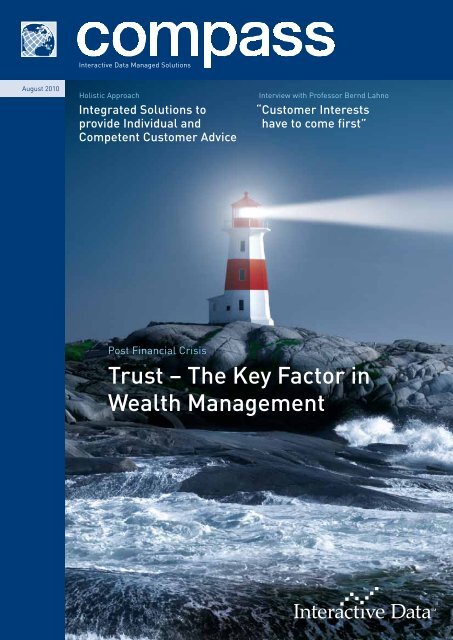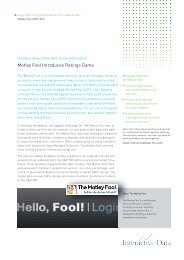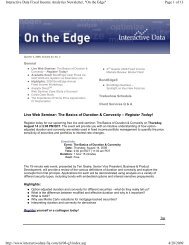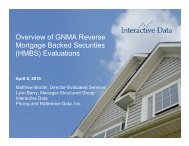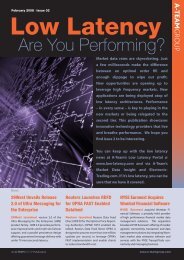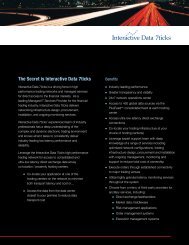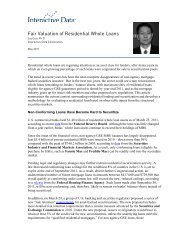Trust â The Key Factor in Wealth Management - Interactive Data
Trust â The Key Factor in Wealth Management - Interactive Data
Trust â The Key Factor in Wealth Management - Interactive Data
Create successful ePaper yourself
Turn your PDF publications into a flip-book with our unique Google optimized e-Paper software.
<strong>Interactive</strong> <strong>Data</strong> Managed Solutions<br />
August 2010<br />
Holistic Approach<br />
Integrated Solutions to<br />
provide Individual and<br />
Competent Customer Advice<br />
Interview with Professor Bernd Lahno<br />
“Customer Interests<br />
have to come first”<br />
Post F<strong>in</strong>ancial Crisis<br />
<strong>Trust</strong> – <strong>The</strong> <strong>Key</strong> <strong>Factor</strong> <strong>in</strong><br />
<strong>Wealth</strong> <strong>Management</strong>
August 2010<br />
www.<strong>in</strong>teractivedata.com<br />
Content<br />
Editorial 03<br />
<br />
Markets<br />
Post F<strong>in</strong>ancial Crisis 04<br />
<strong>Trust</strong> – <strong>The</strong> <strong>Key</strong> <strong>Factor</strong> <strong>in</strong> <strong>Wealth</strong> <strong>Management</strong><br />
What is <strong>Trust</strong>? 05<br />
When Image, Integrity and Emotions come together<br />
Solutions<br />
Compliance 06<br />
Implement<strong>in</strong>g Compliance Requirements <strong>in</strong> a Reliable and Cost-Conscious Manner<br />
Holistic Approach 08<br />
Integrated Solutions to provide Individual and Competent Customer Advice<br />
Op<strong>in</strong>ion<br />
Interview with Professor Bernd Lahno 10<br />
“Customer Interests have to come first”<br />
Publisher<br />
Responsible for the Contents<br />
Editors<br />
Art Direction, Production<br />
Image Sources<br />
Contact<br />
<strong>Interactive</strong> <strong>Data</strong> Managed Solutions AG, represented by Carsten Dirks<br />
Carsten Dirks<br />
Anke vom Berg, Christ<strong>in</strong>a Lotz<br />
Kar<strong>in</strong> Lange, Design Intelligence<br />
<strong>Interactive</strong> <strong>Data</strong>, Kar<strong>in</strong> Lange (Compos<strong>in</strong>g), iStockphoto, Prof. Bernd Lahno<br />
<strong>Interactive</strong> <strong>Data</strong> Managed Solutions AG<br />
Sandweg 94 • 60316 Frankfurt am Ma<strong>in</strong> • Germany<br />
Tel: +49(0) 69 505030 0 • Fax: +49(0) 069 505030 505<br />
www.<strong>in</strong>teractivedata.com • <strong>in</strong>fo-ms@<strong>in</strong>teractivedata.com<br />
Registration Court Frankfurt am Ma<strong>in</strong>, Registration Number 49611, Turnover ID Number DE 114172084.<br />
<strong>Interactive</strong> <strong>Data</strong> Managed Solutions AG is not liable for any errors, factual or otherwise, conta<strong>in</strong>ed here<strong>in</strong>.<br />
02<br />
Copyright 2010 <strong>Interactive</strong> <strong>Data</strong> Managed Solutions AG.
August 2010<br />
www.<strong>in</strong>teractivedata.com<br />
Editorial<br />
Ladies and gentlemen,<br />
F<strong>in</strong>ancial market crises are often crises of confidence. <strong>The</strong> ups and downs on the exchanges,<br />
the bankruptcies of traditional bank houses and the scandals <strong>in</strong>volv<strong>in</strong>g <strong>in</strong>vestment fraudsters<br />
such as Bernard Madoff have cast an entire sector <strong>in</strong> a bad light and underm<strong>in</strong>ed its<br />
credibility. At the <strong>in</strong>dividual level, both f<strong>in</strong>ancial losses and unfulfilled expectations of returns<br />
have added to the woes of private clients. This puts the f<strong>in</strong>ancial economy <strong>in</strong> a tight spot,<br />
s<strong>in</strong>ce it is the f<strong>in</strong>ancial economy, more so than other sectors, that is dependent on the trust<br />
of market participants.<br />
Carsten Dirks<br />
Global Manag<strong>in</strong>g Director<br />
of <strong>Wealth</strong> <strong>Management</strong><br />
Products,<br />
<strong>Interactive</strong> <strong>Data</strong><br />
carsten.dirks@<strong>in</strong>teractivedata.com<br />
At present, there is much discussion about how best <strong>in</strong>vestor trust can be restored. “Greater controls<br />
and transparency,” demand the State and consumer protection agencies <strong>in</strong> unison, call<strong>in</strong>g for even<br />
stricter f<strong>in</strong>ancial market regulation. Op<strong>in</strong>ion polls on the topics of trust and <strong>in</strong>vestment advisory services,<br />
however, reveal yet aga<strong>in</strong> that it is not the State but dependable personal relationships that play a pivotal<br />
role for the majority of the poll participants. Participants have a palpable desire to rely on the competence,<br />
knowledge and fairness of an <strong>in</strong>dividual or an <strong>in</strong>stitution. Bank clients first and foremost want technically<br />
competent contact persons who take their requirements seriously and offer needs-based advisory plans.<br />
We too wish to structure our client relationships <strong>in</strong> accordance with this pr<strong>in</strong>ciple. Many of our relationships<br />
have developed over the years <strong>in</strong>to trust<strong>in</strong>g partnerships with a regular exchange of views on the<br />
solutions deployed and the implementation of new requirements play<strong>in</strong>g an important role. We f<strong>in</strong>d it<br />
important to rema<strong>in</strong> <strong>in</strong> constant dialog, for only thus can we cont<strong>in</strong>ue to offer our clients <strong>in</strong>dividualized,<br />
comprehensive solutions designed to best meet their requirements.<br />
Bernd Lahno, Professor of Philosphy at the Frankfurt School of F<strong>in</strong>ance & <strong>Management</strong>, Germany, has<br />
studied the concept of “trust” for many years, and <strong>in</strong> 2002 qualified as a professor with a paper on this<br />
topic. He expla<strong>in</strong>s on pages 10 and 11 why f<strong>in</strong>ancial market regulation is by itself <strong>in</strong>sufficient to combat<br />
uncerta<strong>in</strong>ty among <strong>in</strong>dividuals, and the measures that banks should adopt at this time.<br />
S<strong>in</strong>cerely,<br />
Carsten Dirks<br />
03
August 2010<br />
www.<strong>in</strong>teractivedata.com<br />
Markets<br />
Post f<strong>in</strong>ancial crisis<br />
<strong>Trust</strong> – <strong>The</strong> <strong>Key</strong> <strong>Factor</strong> <strong>in</strong><br />
<strong>Wealth</strong> <strong>Management</strong><br />
<strong>The</strong> consequences of the f<strong>in</strong>ancial crisis will cont<strong>in</strong>ue to keep the f<strong>in</strong>ancial sector occupied for a long<br />
time and lead to fundamental changes. Numerous studies, such as the latest report from the European<br />
Economic Advisory Group (EEAG), a panel of experts which has been provid<strong>in</strong>g advice on important matters<br />
of economic policy to European policy makers s<strong>in</strong>ce 2001, show a pronounced loss of trust <strong>in</strong> the f<strong>in</strong>ancial<br />
sector on the part of consumers. Accord<strong>in</strong>g to this report, the percentage of people who trusted banks,<br />
stockbrokers and <strong>in</strong>vestment funds was 30 percent <strong>in</strong> 2007 shortly before the crisis broke out, then fell to<br />
a mere five percent and has not recovered s<strong>in</strong>ce.<br />
<strong>The</strong> conduct of advisors is what counts<br />
This destruction of trust, of pivotal importance primarily <strong>in</strong> wealth<br />
management, has a significant effect on <strong>in</strong>vestor conduct and consequently<br />
on the future growth of the f<strong>in</strong>ancial markets. As the EEAG report<br />
shows, the read<strong>in</strong>ess to <strong>in</strong>vest <strong>in</strong> complex f<strong>in</strong>ancial <strong>in</strong>struments is taper<strong>in</strong>g<br />
off <strong>in</strong> favor of proven securities, at the same time that cash <strong>in</strong>vestments<br />
<strong>in</strong> trusted domestic markets and companies are ga<strong>in</strong><strong>in</strong>g importance.<br />
In addition, there is a discernible trend towards risk diversification<br />
with <strong>in</strong>vestors choos<strong>in</strong>g a greater number of f<strong>in</strong>ancial services providers<br />
and reduc<strong>in</strong>g volumes allocated to <strong>in</strong>dividual bus<strong>in</strong>ess relationships.<br />
Based on a current study by GfK Marktforschung (a market research company), 58 percent of bank clients<br />
believe that their <strong>in</strong>vestment advisors sold them products they do not need <strong>in</strong> the least out of self-<strong>in</strong>terest<br />
and with a view to quick profits. <strong>The</strong>y further criticized their advisors for not pay<strong>in</strong>g sufficient attention<br />
to their requirements and provid<strong>in</strong>g f<strong>in</strong>ancial plann<strong>in</strong>g with a cookie-cutter approach. In addition,<br />
two thirds of <strong>in</strong>dividuals surveyed expressed a desire to understand f<strong>in</strong>ancial products better <strong>in</strong> addition<br />
to be<strong>in</strong>g able to trust their f<strong>in</strong>ancial consultants and understand what they had to say. Meanwhile,<br />
clients are extremely <strong>in</strong>terested <strong>in</strong> customized <strong>in</strong>vestment products and customized forms of <strong>in</strong>vestment<br />
and wish to fully understand the mode of operation and the <strong>in</strong>terplay of such products and <strong>in</strong>vestments.<br />
While the appeal of banks has taken a beat<strong>in</strong>g <strong>in</strong> general, the client’s own <strong>in</strong>stitution has garnered comparatively<br />
good confidence numbers at 60 percent. By contrast, only 34 percent of people surveyed trust<br />
their personal contact. While this is clearly better than the rat<strong>in</strong>g for the <strong>in</strong>dustry as a whole, it also<br />
<strong>in</strong>dicates that personal advisors rather than <strong>in</strong>stitutions are blamed for negative experiences.<br />
More regulation does not automatically foster trust<br />
This theory is underp<strong>in</strong>ned by a market study by the Bundesanstalt für F<strong>in</strong>anzaufsicht (BaF<strong>in</strong>) <strong>in</strong> Germany,<br />
which has conducted research on the implementation of regulations regard<strong>in</strong>g the documentation of<br />
<strong>in</strong>vestment advisory services to private clients that have been <strong>in</strong> place s<strong>in</strong>ce the beg<strong>in</strong>n<strong>in</strong>g of the year.<br />
A clear need for improvement can be seen: At 15 credit <strong>in</strong>stitutions and 37 f<strong>in</strong>ancial service provider<br />
<strong>in</strong>stitutions, forms for record<strong>in</strong>g client <strong>in</strong>teraction listed pre-formulated choices alone and did not leave<br />
any space for clients to state their personal circumstances or <strong>in</strong>vestment objectives. Employees were not<br />
sufficiently tra<strong>in</strong>ed either to appropriately document <strong>in</strong>dividual client details.<br />
<strong>The</strong> EEAG report states that, while strong market regulation is required, the restoration of trust can<br />
succeed only through a quality offensive by <strong>in</strong>dustry.<br />
Measures for f<strong>in</strong>ancial regulation are scheduled to be discussed at the global level <strong>in</strong> the context of the<br />
G20 summit and the F<strong>in</strong>ancial Stabilization Committee. Accord<strong>in</strong>g to the EEAG report, <strong>in</strong> addition to the<br />
well-known European <strong>in</strong>itiatives, the US government under President Barack Obama is consider<strong>in</strong>g a<br />
Consumer Protection Authority as well as an entity to combat f<strong>in</strong>ancial crime <strong>in</strong> the USA. Regulatory<br />
measures are meant to protect <strong>in</strong>vestors. Otherwise they will rema<strong>in</strong> abstract for consumers, and a direct<br />
positive effect on lost trust cannot be unconditionally assumed.<br />
04
August 2010<br />
www.<strong>in</strong>teractivedata.com<br />
Markets<br />
Banks themselves tak<strong>in</strong>g an active role<br />
Initiatives by the f<strong>in</strong>ancial sector to re<strong>in</strong>force their reputation with consumers and restore lost trust <strong>in</strong><br />
the entire system and <strong>in</strong> the delicate area of wealth management <strong>in</strong> particular have been more promis<strong>in</strong>g<br />
by far. Concepts such as honesty, reliability, safety and fairness towards clients play an important<br />
role and decisively affect success <strong>in</strong> the marketplace. Some <strong>in</strong>stitutions are reconsider<strong>in</strong>g the <strong>in</strong>vestment<br />
advisory services that they currently offer, and feel that fundamental client objectives should take<br />
priority and be accompanied by match<strong>in</strong>g f<strong>in</strong>ancial products and <strong>in</strong>dividual advice. Clients should be<br />
made to feel that the person sitt<strong>in</strong>g opposite him puts himself <strong>in</strong> their place, works out <strong>in</strong>dividual solutions<br />
with them and <strong>in</strong>cludes them <strong>in</strong> the <strong>in</strong>vestment process. Documentation that is easily understood<br />
and a clear presentation of products, <strong>in</strong>clud<strong>in</strong>g comparisons, are musts.<br />
In addition to re<strong>in</strong>forc<strong>in</strong>g advisory competencies, optimized processes, susta<strong>in</strong>ed quality management<br />
and the <strong>in</strong>telligent use of <strong>in</strong>formation, technology can contribute to the success of trust <strong>in</strong>itiatives at many<br />
<strong>in</strong>stitutions. Well thought out workflows can be generated through the use of networked systems, br<strong>in</strong>g<strong>in</strong>g<br />
an entirely new quality to the advisory process. Information retrieved through a central database <strong>in</strong> a<br />
short span of time and presented <strong>in</strong> the relevant context can convey a sense of security to the client.<br />
<strong>The</strong> client of the future will be mobile and more <strong>in</strong>formed. Transparency, credibility, social awareness and<br />
susta<strong>in</strong>ability will be high on his list of priorities. Banks can adopt these fundamental bus<strong>in</strong>ess trends<br />
<strong>in</strong> the <strong>in</strong>terests of their clients and their<br />
bus<strong>in</strong>ess to differentiate themselves<br />
successfully <strong>in</strong> the hotly contested wealth<br />
management area and contribute to<br />
restor<strong>in</strong>g and durably stabiliz<strong>in</strong>g lost<br />
client trust. <br />
Info:<br />
• DB Research, “Global bank<strong>in</strong>g trends after the crisis”, June 2009<br />
• EEAG (2010), “A trust-driven f<strong>in</strong>ancial crisis”, Chapter 2, <strong>in</strong>:<br />
<strong>The</strong> EEAG Report on the European Economy 2010, Munich<br />
• GfK Marktforschung: Studies on current levels of trust by Germans <strong>in</strong><br />
<strong>in</strong>stitutions, banks and <strong>in</strong>surance companies, March 2010<br />
• TNS Infratest: “<strong>Trust</strong>, cash <strong>in</strong>vestments and advisory requirements after<br />
the f<strong>in</strong>ancial crisis”, March 2010<br />
• zeb/rolfes.schiereneck.associates: “Grow<strong>in</strong>g demand for social bank<strong>in</strong>g”,<br />
November 2009<br />
What is <strong>Trust</strong>?<br />
When Image, Integrity and Emotions<br />
come together<br />
Numerous op<strong>in</strong>ion research <strong>in</strong>stitutes and scientific studies charge the f<strong>in</strong>ancial sector with a massive<br />
collapse of trust and emphatically recommend action to recover from this loss of client trust. “<strong>Trust</strong>” is a<br />
“soft” concept <strong>in</strong> a market made up of hard f<strong>in</strong>ancial facts. A common def<strong>in</strong>ition of trust is “the expectation<br />
that one will not be disadvantaged by<br />
another’s conduct”. This expla<strong>in</strong>s why the<br />
years 2008 and 2009, dur<strong>in</strong>g which governments<br />
had to put together packages worth<br />
billions to defray the costs of risky transactions<br />
by a few f<strong>in</strong>ancial <strong>in</strong>stitutions, have<br />
damaged these <strong>in</strong>stitutions’ stand<strong>in</strong>g <strong>in</strong><br />
the eyes of the general public and <strong>in</strong>vestors.<br />
<strong>The</strong>re is widespread agreement that<br />
the sector faces a problem of trust. What<br />
creates trust, though, and how can trust<br />
be rega<strong>in</strong>ed? Various factors must come<br />
together for f<strong>in</strong>ancial <strong>in</strong>stitutions to be<br />
viewed as trustworthy, and different scientific<br />
discipl<strong>in</strong>es offer differ<strong>in</strong>g views.<br />
Studies by market<strong>in</strong>g and communications<br />
specialists on trust and image <strong>in</strong> the economy<br />
show that the significance of <strong>in</strong>dividual<br />
» <strong>Trust</strong> is a particular level of the subjective probability with which an<br />
agent assesses that another agent or group of agents will perform<br />
a particular action, both before he can monitor such action and <strong>in</strong> a<br />
context <strong>in</strong> which it affects his own action. «<br />
Diego Gambetta <strong>in</strong> „Can we trust <strong>Trust</strong>“?, 1988<br />
» <strong>Trust</strong> is a background to everyday <strong>in</strong>teraction through which the<br />
predictability, legibility and reliability of collective order is susta<strong>in</strong>ed,<br />
while the perception of its complexity and uncerta<strong>in</strong>ty is restricted. «<br />
J.B. Barney and M.H. Hansen, Strategic <strong>Management</strong> Journal, 15, 1994<br />
»<br />
<strong>Trust</strong> is the expectation that partners <strong>in</strong> <strong>in</strong>teraction will carry out<br />
their fiduciary obligations and responsibilities, that is, their duties<br />
<strong>in</strong> certa<strong>in</strong> situations to place others’ <strong>in</strong>terests before their own. «<br />
Bernard Barber, „<strong>The</strong> Logic and Limits of <strong>Trust</strong>“, 1983<br />
05
August 2010<br />
www.<strong>in</strong>teractivedata.com<br />
Market / Solutions<br />
trust-build<strong>in</strong>g criteria varies. <strong>The</strong> latest version of the annual <strong>in</strong>ternational Edelman <strong>Trust</strong>barometer<br />
shows that at this time, robust f<strong>in</strong>ancial results from a company are significantly less capable of project<strong>in</strong>g<br />
a positive image of a company than transparency and <strong>in</strong>tegrity, product and service quality, and the<br />
organization’s communication style.<br />
Globally, trust and transparency now drive corporate reputation<br />
as much as quality<br />
Source: Edelman <strong>Trust</strong> Barometer<br />
S<strong>in</strong>ce trust is as a rule very closely l<strong>in</strong>ked<br />
to a company‘s reputation, much is <strong>in</strong>vested<br />
<strong>in</strong> market<strong>in</strong>g and public relations <strong>in</strong> order<br />
to build and ma<strong>in</strong>ta<strong>in</strong> a positive image<br />
through targeted communications. This<br />
must then be followed up by direct contact,<br />
though. Many f<strong>in</strong>ancial <strong>in</strong>stitutions tackle<br />
this through attempts to <strong>in</strong>crease product<br />
transparency and quality on the one<br />
hand, and measures to get to know clients<br />
better on the other. Frequently, technological<br />
solutions such as CRM applications,<br />
computer-generated product document-<br />
ation or <strong>in</strong>tensive client report<strong>in</strong>g are resorted to. In addition to the practicability of such approaches and<br />
the technical verifiability of results, the fairly positive image of <strong>in</strong>formation technology also benefits banks.<br />
In the Edelman <strong>Trust</strong>barometer, over 70 percent of <strong>in</strong>dividuals polled <strong>in</strong> the <strong>in</strong>dustrialized nations of the<br />
West report hav<strong>in</strong>g confidence <strong>in</strong> the technology sector. <strong>The</strong> correspond<strong>in</strong>g figure for the f<strong>in</strong>ancial sector is<br />
only 24 percent on an average, however.<br />
When all is said and done, objective facts and emotional factors must be merged for trust to be confirmed.<br />
Programs to enhance client orientation and transparency will be successful <strong>in</strong> the medium short term<br />
only if they become a way of life for advisors and resonate with clients at the emotional level. <br />
Info: http://www.edelman.com/trust<br />
Compliance<br />
Implement<strong>in</strong>g Compliance Requirements <strong>in</strong><br />
a Reliable and Cost-Conscious Manner<br />
Over the past few years, the f<strong>in</strong>ancial <strong>in</strong>dustry <strong>in</strong> Europe has been faced with a flood of regulatory guidel<strong>in</strong>es<br />
and amendments <strong>in</strong>tended to help protect private clients from mak<strong>in</strong>g poor <strong>in</strong>vestment decisions. <strong>The</strong> need<br />
for prompt implementation of these guidel<strong>in</strong>es has garnered further impetus due to the f<strong>in</strong>ancial crisis and<br />
the result<strong>in</strong>g loss of trust <strong>in</strong> banks, both among <strong>in</strong>vestors and <strong>in</strong> policy-mak<strong>in</strong>g circles.<br />
<strong>The</strong> implementation of these guidel<strong>in</strong>es poses new challenges for centralized service areas <strong>in</strong> f<strong>in</strong>ancial<br />
<strong>in</strong>stitutions such as support, advisory services, sales and new client acquisition, and not just adm<strong>in</strong>istratively.<br />
Technical and organizational adjustments as well as <strong>in</strong>vestments <strong>in</strong> employee tra<strong>in</strong><strong>in</strong>g represent a<br />
significant cost factor.<br />
In addition, globally active companies need to take a good look at country specific regulations, which are not<br />
always harmonized even with<strong>in</strong> the European Union. Besides the EU Commission, <strong>in</strong>ternational f<strong>in</strong>ancial<br />
regulatory authorities, such as the German Federal F<strong>in</strong>ancial Supervisory Authority (BAF<strong>in</strong>, Bundesanstalt<br />
für F<strong>in</strong>anzdienstleistungsaufsicht) or the British FSA (F<strong>in</strong>ancial Services Authority) are work<strong>in</strong>g under heavy<br />
pressure to create a better environment for transparency and comprehensibility <strong>in</strong> <strong>in</strong>vestment advisory<br />
services.<br />
06<br />
<strong>The</strong> Directive on Markets <strong>in</strong> F<strong>in</strong>ancial Instruments (MiFiD), laid down <strong>in</strong> 2007, is expected to be amended next<br />
year to plug loopholes <strong>in</strong> the regulation of securities trad<strong>in</strong>g. Compliance and risk management departments<br />
<strong>in</strong> banks, as well as regulators and providers of compliance software solutions with a presence <strong>in</strong><br />
the MiFID environment, require historical f<strong>in</strong>ancial market data for their analyses. <strong>Interactive</strong> <strong>Data</strong> provides
August 2010<br />
www.<strong>in</strong>teractivedata.com<br />
Solutions<br />
historical <strong>in</strong>traday market data and prices from a<br />
number of stock exchanges on a tick-by-tick basis,<br />
which can be used for a variety of tasks, from backtest<strong>in</strong>g<br />
<strong>in</strong>vestment strategies or new products to<br />
risk management for proprietary <strong>in</strong>vestments or<br />
client funds, and from assessments of the best<br />
execution of client orders (Best Execution) to market<br />
conformity tests.<br />
Information Sheet for F<strong>in</strong>ancial Products<br />
In anticipation of an <strong>in</strong>ternational “<strong>Key</strong> Information<br />
Document” currently under review by the Committee<br />
of European Securities Regulators (CESR)<br />
and expected to become b<strong>in</strong>d<strong>in</strong>g <strong>in</strong> 2011, several<br />
associations and f<strong>in</strong>ancial <strong>in</strong>stitutions have reacted<br />
proactively to the EU Guidel<strong>in</strong>es on Investor Protection<br />
and developed a standardized <strong>in</strong>formation<br />
sheet to expla<strong>in</strong> <strong>in</strong> detail the structure of <strong>in</strong>vestment<br />
products and the risks <strong>in</strong>volved. Such an<br />
<strong>in</strong>formation sheet, which lays out a comparison of<br />
f<strong>in</strong>ancial products <strong>in</strong> layman’s terms, will presumably<br />
be published soon primarily <strong>in</strong> areas of<br />
popular <strong>in</strong>vestment products, such as mutual<br />
funds, and complex products that need more<br />
explanation such as derivatives.<br />
EU directives planned for<br />
the <strong>in</strong>vestment sector<br />
<strong>The</strong> follow<strong>in</strong>g regulations are anticipated to be <strong>in</strong>corporated <strong>in</strong>to<br />
national law throughout Europe by 2012.<br />
Revision to the MiFID (Markets <strong>in</strong> F<strong>in</strong>ancial Instruments<br />
Directive): <strong>The</strong> revision seeks to verify the extent to which this<br />
directive has been implemented <strong>in</strong> national law and to identify<br />
areas where reforms may be required. Special paths, such as<br />
the brokerage of <strong>in</strong>vestment funds under Paragraph 34c GewO<br />
(German Industrial Code) <strong>in</strong> Germany, have been scrut<strong>in</strong>ized.<br />
UCITS IV (Undertak<strong>in</strong>gs for Collective Investments <strong>in</strong> Transferable<br />
Securities): Investment funds regulated by the EU may<br />
be sold <strong>in</strong> all member countries of the Union after notify<strong>in</strong>g the<br />
appropriate supervisory authority.<br />
AIFM (Alternative Investment Funds Managers): Directive for<br />
the supervision of alternative <strong>in</strong>vestment fund managers, which<br />
also considers closed-end funds that have hitherto rema<strong>in</strong>ed<br />
unregulated.<br />
PRIPs (Packaged Retailed Investment Products): An <strong>in</strong>itiative<br />
for standardized <strong>in</strong>vestor <strong>in</strong>formation and sales regulations for<br />
funds and derivatives and other structured <strong>in</strong>vestment products.<br />
<strong>The</strong> first measure result<strong>in</strong>g from this <strong>in</strong>itiative: KID (<strong>Key</strong> Information<br />
Document), a two page product <strong>in</strong>formation sheet under<br />
European standards provid<strong>in</strong>g <strong>in</strong>formation about product profitability,<br />
risks, charges, guarantees and mode of operation.<br />
Source: European Capital Markets Institute (ECMI), CFA Institute Centre<br />
for F<strong>in</strong>ancial Market Integrity, European Commission Services As of: April 2010<br />
<strong>Interactive</strong> <strong>Data</strong> supports its clients <strong>in</strong> the specification,<br />
design and development of fact sheets,<br />
<strong>in</strong> the selection and set-up of appropriate data<br />
management <strong>in</strong>terfaces, and <strong>in</strong> choos<strong>in</strong>g appropriate<br />
methods of documentation and their implementation.<br />
This is designed to assist advisors with documentation requirements with<strong>in</strong> the client advisory<br />
processes, allow<strong>in</strong>g the costs, risks and opportunities of <strong>in</strong>vestments to be presented to clients <strong>in</strong> a manner<br />
that is easy to comprehend and visually attractive.<br />
Companies that make timely use of new regulatory provisions to br<strong>in</strong>g about long overdue changes can<br />
ga<strong>in</strong> competitive advantage while simultaneously optimiz<strong>in</strong>g their front and back office process<strong>in</strong>g <strong>in</strong> a<br />
cost-effective manner. <br />
Bus<strong>in</strong>ess Entity Service<br />
With the <strong>in</strong>tense focus on compliance and risk management <strong>in</strong> the f<strong>in</strong>ancial sector, especially <strong>in</strong><br />
times of volatile markets, corporate data (bus<strong>in</strong>ess entity data) becomes <strong>in</strong>creas<strong>in</strong>gly important.<br />
F<strong>in</strong>ancial services providers are obligated to provide <strong>in</strong>formation, such as company hold<strong>in</strong>gs, at any<br />
time. This requires expensive and time-consum<strong>in</strong>g manual comparisons, s<strong>in</strong>ce data is frequently<br />
ma<strong>in</strong>ta<strong>in</strong>ed <strong>in</strong> isolated silos with<strong>in</strong> companies.<br />
<strong>The</strong> Bus<strong>in</strong>ess Entity Service from <strong>Interactive</strong> <strong>Data</strong> provides <strong>in</strong>formation regard<strong>in</strong>g a company’s<br />
capital structure and securities. Details regard<strong>in</strong>g the relationship between security, issuer and<br />
parent company can be retrieved simply by enter<strong>in</strong>g an ISIN code.<br />
This can help companies effectively manage and m<strong>in</strong>imize their counterparty and <strong>in</strong>vestor risks<br />
and also to satisfy compliance requirements under UCITS III, the 3rd EU Directive on Money<br />
Launder<strong>in</strong>g, Basel II and the Directive on Markets <strong>in</strong> F<strong>in</strong>ancial Instruments (MiFiD).<br />
http://www.<strong>in</strong>teractivedata.com/<strong>in</strong>dex.php/productsandservices/content/id/Bus<strong>in</strong>ess+Entity+<strong>Data</strong><br />
Info: www.baf<strong>in</strong>.de • www.fsa.gov.uk • www.bba.org.uk • www.aba com<br />
07
August 2010<br />
www.<strong>in</strong>teractivedata.com<br />
Solutions<br />
Holistic Approach<br />
Integrated Solutions to provide Individual<br />
and Competent Customer Advice<br />
Investors want comprehensive and <strong>in</strong>dividualized support from advisors who are trustworthy, well <strong>in</strong>formed<br />
and able to expla<strong>in</strong> products clearly with <strong>in</strong>vestment recommendations that are easy to understand. <strong>The</strong><br />
demand for quality advice is noth<strong>in</strong>g new, but has <strong>in</strong>creased as a result of the f<strong>in</strong>ancial crisis. <strong>Trust</strong>worthy<br />
relationships between bank and <strong>in</strong>vestors are a s<strong>in</strong>e qua non precisely <strong>in</strong> the area of wealth management.<br />
A well connected and well <strong>in</strong>formed <strong>in</strong>vestment<br />
advisor plays a key role, s<strong>in</strong>ce private <strong>in</strong>vestors<br />
depend on such advisors to filter through, verify<br />
and assess a variety of sources.<br />
Integrated solutions from <strong>Interactive</strong> <strong>Data</strong> are<br />
designed to support advisory workflows <strong>in</strong> multiple<br />
ways and open up new opportunities for holistic<br />
customer support and <strong>in</strong>creased efficiency <strong>in</strong> the<br />
<strong>in</strong>vestment process. Besides broad global data<br />
coverage, a variety of analysis and report<strong>in</strong>g tools<br />
are available that help to mean<strong>in</strong>gfully consolidate<br />
this diverse and complex set of <strong>in</strong>formation,<br />
present it <strong>in</strong> a visually appeal<strong>in</strong>g way and calibrate<br />
it to client <strong>in</strong>vestment objectives and client risk<br />
capacity. Customer relationship or portfolio management<br />
systems can be <strong>in</strong>tegrated just as seamlessly<br />
as <strong>in</strong>-house research and product <strong>in</strong>formation. This<br />
<strong>in</strong>tegration br<strong>in</strong>gs significant additional value to<br />
Multiple <strong>in</strong>ternal and external data sources are comb<strong>in</strong>ed and <strong>in</strong>tegrated exist<strong>in</strong>g applications as well. If no client-specific<br />
<strong>in</strong>to a f<strong>in</strong>ancial dashboard. Authorizations for feature sets, adm<strong>in</strong>istrative portal solutions need to be deployed, the web-based<br />
functionality and data depth can be customized which allows the software f<strong>in</strong>ancial desktop PrimeTerm<strong>in</strong>al Professional from<br />
to be precisely tailored to the requirements of <strong>in</strong>dividual advisors.<br />
<strong>Interactive</strong> <strong>Data</strong> can be optionally <strong>in</strong>tegrated <strong>in</strong>to<br />
exist<strong>in</strong>g system architectures. In addition, the fact<br />
that authorizations for feature sets, adm<strong>in</strong>istrative functionality and data depth can be customized allows<br />
the software to be precisely tailored to the requirements of <strong>in</strong>dividual advisors.<br />
All systems are designed to be <strong>in</strong>tuitive to use and to be <strong>in</strong>tegrated flexibly <strong>in</strong>to exist<strong>in</strong>g workflows. Innovative<br />
visuals help to highlight <strong>in</strong>formation about new and exist<strong>in</strong>g <strong>in</strong>vestments <strong>in</strong> a relevant context while<br />
improv<strong>in</strong>g quality.<br />
Transparent representation, analysis and optimization of portfolios<br />
An <strong>in</strong>tegrated system facilitates a coherent, holistic advisory approach that can be tailored to client requirements.<br />
<strong>The</strong> system is based on a comb<strong>in</strong>ation of multiple <strong>in</strong>ternal and external data sources <strong>in</strong>tegrated<br />
<strong>in</strong>to a f<strong>in</strong>ancial dashboard.<br />
<strong>The</strong> Portfolio Report<strong>in</strong>g solution from <strong>Interactive</strong> <strong>Data</strong> can be <strong>in</strong>cluded on such a dashboard. Client portfolios<br />
that are updated daily can be retrieved at any time, along with reports, purchase recommendations<br />
and sophisticated analyses tailored to the portfolio structure. <strong>The</strong> <strong>in</strong>novative application with attractive and<br />
user-friendly visuals and navigation allows both advisors and <strong>in</strong>vestors to access the portfolio. Both can<br />
communicate directly through the application, analyze the latest developments <strong>in</strong> the client’s <strong>in</strong>vestments<br />
and jo<strong>in</strong>tly coord<strong>in</strong>ate steps to be taken.<br />
<strong>The</strong> portfolio solution is designed to provide valuable support <strong>in</strong> re<strong>in</strong>forc<strong>in</strong>g client trust and creat<strong>in</strong>g strong<br />
long-term relationships with advisors and f<strong>in</strong>ancial <strong>in</strong>stitutions with a high level of transparency.<br />
08
August 2010<br />
www.<strong>in</strong>teractivedata.com<br />
Solutions<br />
F<strong>in</strong>ancial portals of the future - networked <strong>in</strong> an <strong>in</strong>teractive environment<br />
F<strong>in</strong>ancial portals and websites can jo<strong>in</strong> the trend towards greater transparency and network<strong>in</strong>g, for<br />
example, by <strong>in</strong>tegrat<strong>in</strong>g the presentation of important market data and figures with articles by f<strong>in</strong>ance<br />
editors. Appropriate context sett<strong>in</strong>g and visuals are designed to make the task of understand<strong>in</strong>g and<br />
compar<strong>in</strong>g complex <strong>in</strong>struments much easier. With just a few mouse clicks, users can construct personalized<br />
pages and views reflect<strong>in</strong>g their <strong>in</strong>terests where personal<br />
notes and assessments can be recorded.<br />
<strong>The</strong> next generation of clients will be “digital natives” who use multiple<br />
channels every day to network and exchange <strong>in</strong>formation. Unlike their<br />
parents and grandparents, their loyalty to any one bank<strong>in</strong>g <strong>in</strong>stitution<br />
cannot be taken for granted, they can be “enticed away” <strong>in</strong>telligently,<br />
that is to say, they can be pursued <strong>in</strong> these new channels with proprietary<br />
bank<strong>in</strong>g solutions <strong>in</strong>tegrated <strong>in</strong>to social networks.<br />
Monolithic bank websites and f<strong>in</strong>ancial portals have outlived their purpose<br />
as stand-alone sources of <strong>in</strong>formation. Only those that exploit the<br />
channels of the “Social Web” can rema<strong>in</strong> competitive from a long-term<br />
perspective. Client-specific solutions are key <strong>in</strong> the form of applications<br />
for personal homepages, social networks such as Facebook or Twitter,<br />
and mobile devices such as iPhone and Blackberry. All of these offer<br />
access to the f<strong>in</strong>ancial portal and the price <strong>in</strong>formation, charts, portfolios<br />
and watchlists on the portal, and allow bank<strong>in</strong>g transactions even when<br />
travel<strong>in</strong>g.<br />
Holistic approach<br />
In order to <strong>in</strong>tegrate and manage both the various sources of <strong>in</strong>com<strong>in</strong>g<br />
market data and <strong>in</strong>formation and the large number of communication<br />
channels, a holistic approach and a comprehensive data consolidation<br />
strategy is called for. <strong>Interactive</strong> <strong>Data</strong>’s market data platform is designed<br />
to deliver a variety of content to <strong>in</strong>teractive <strong>in</strong>terfaces us<strong>in</strong>g Rich Internet<br />
technologies such as JavaScript, Flash and AJAX. <strong>Interactive</strong> <strong>Data</strong> also<br />
br<strong>in</strong>gs it long-stand<strong>in</strong>g expertise <strong>in</strong> workflow optimization to bear, provid<strong>in</strong>g<br />
support to f<strong>in</strong>ancial service providers from concept and design<br />
through the deployment of state-of-the-art technologies for their mobile<br />
clients.<br />
This approach allows data to be oriented to target groups, and users can<br />
obta<strong>in</strong> p<strong>in</strong>po<strong>in</strong>ted <strong>in</strong>formation where they need it. Users can <strong>in</strong>teract with<br />
one another and can tap expertise <strong>in</strong> the form of contextual <strong>in</strong>formation.<br />
User-friendly applications that are <strong>in</strong>tuitive to use and accessible from<br />
anywhere are an important factor <strong>in</strong> br<strong>in</strong>g<strong>in</strong>g structure to the <strong>in</strong>creas<strong>in</strong>gly<br />
complex daily flood of <strong>in</strong>formation and can contribute decisively to the<br />
client‘s perception of the f<strong>in</strong>ancial <strong>in</strong>stitution as a trustworthy partner. <br />
Users can obta<strong>in</strong> p<strong>in</strong>po<strong>in</strong>ted <strong>in</strong>formation where<br />
they need it and can tap expertise <strong>in</strong> the form of<br />
contextual <strong>in</strong>formation.<br />
Info: www.<strong>in</strong>teractivedata.com<br />
09
August 2010<br />
www.<strong>in</strong>teractivedata.com<br />
Op<strong>in</strong>ion<br />
Interview with Professor Bernd Lahno<br />
“Customer Interests have to come first”<br />
In contrast to the usual view <strong>in</strong> economics and decision theory, that trust is a rational expectation, Professor<br />
Bernd Lahno def<strong>in</strong>es it as an emotional attitude. An attitude that makes the <strong>in</strong>dividual vulnerable, but without<br />
which social life would be impossible.<br />
Bernd Lahno was promoted to professor 2002 at the University of Duisburg with a work on trust. S<strong>in</strong>ce<br />
September 2006 he has been professor of philosophy at the Frankfurt School of F<strong>in</strong>ance & <strong>Management</strong>,<br />
where <strong>in</strong> addition to his research, he is <strong>in</strong>volved with establish<strong>in</strong>g a new Bachelor of <strong>Management</strong>,<br />
Philosophy & Economics. <strong>The</strong> program is designed to teach executives how to make susta<strong>in</strong>able and<br />
socially acceptable decisions <strong>in</strong> the midst of an <strong>in</strong>creas<strong>in</strong>g <strong>in</strong>terdependence of bus<strong>in</strong>ess, politics and<br />
society.<br />
compass talked with Bernd Lahno about the trust concept and the importance of responsible action <strong>in</strong> the<br />
f<strong>in</strong>ancial <strong>in</strong>dustry.<br />
Professor Lahno, numerous studies show that the f<strong>in</strong>ancial crisis has led to a<br />
considerable loss of trust by citizens <strong>in</strong> the State, the economy and corporations.<br />
How does this affect the f<strong>in</strong>ancial world, which is especially dependent on trust<br />
<strong>in</strong> relationships?<br />
Not all areas of the f<strong>in</strong>ancial economy depend on trust <strong>in</strong> the same way. It is my<br />
impression that actors <strong>in</strong> the f<strong>in</strong>ancial economy are <strong>in</strong>creas<strong>in</strong>gly focus<strong>in</strong>g their<br />
activities <strong>in</strong> areas such as <strong>in</strong>vestment bank<strong>in</strong>g that are relatively unaffected by<br />
the <strong>in</strong>creas<strong>in</strong>g corporate uncerta<strong>in</strong>ty or areas where profit can still be made from<br />
such uncerta<strong>in</strong>ty with some skill. This is completely understandable but has<br />
disastrous consequences. For the impression is also ga<strong>in</strong><strong>in</strong>g that the f<strong>in</strong>ancial<br />
economy as a whole can no longer do sufficient justice to its key social responsibilities,<br />
such as the provision of liquidity to medium-sized enterprises. <strong>The</strong>re is<br />
the danger of a vicious spiral, which is naturally fed by uncerta<strong>in</strong>ty.<br />
Bernd Lahno<br />
Professor of Philosophy<br />
Social theory def<strong>in</strong>es trust as “a read<strong>in</strong>ess to rely on the actions of another.”<br />
Can this pr<strong>in</strong>ciple work <strong>in</strong> the free market economy at all?<br />
at the Frankfurt School<br />
Not only can it work, the market economy is <strong>in</strong> fact dependent on <strong>in</strong>dividuals<br />
of F<strong>in</strong>ance & <strong>Management</strong>,<br />
rely<strong>in</strong>g on the actions of others. Every exchange of goods and services is rooted <strong>in</strong><br />
Germany<br />
uncerta<strong>in</strong>ty. A party must effect an advance performance without any certa<strong>in</strong>ty of<br />
counter-performance. <strong>The</strong> quality of services can be directly assessed only <strong>in</strong> rare<br />
cases, and dur<strong>in</strong>g decl<strong>in</strong>es, one has to trust that the other party will fulfill its guarantee obligations<br />
honestly. Every market participant has to trust that the opposite party either carries out its transactions<br />
honestly on its own <strong>in</strong>itiative or is effectively required to do so by third parties. <strong>Trust</strong> is a mechanism that<br />
allows us to deal with such risks to everyone’s benefit. It is not the sole reason why one should rely on<br />
others, but trust is <strong>in</strong>dispensable when risks cannot be cognitively managed. Several theoretical analyses<br />
show that it is precisely <strong>in</strong> complex markets that this is frequently the case, and empirical studies show<br />
that trust is the key to solv<strong>in</strong>g such problems, and very clearly, <strong>in</strong> the economic context as well.<br />
Is greater state regulation of the markets an appropriate measure for rega<strong>in</strong><strong>in</strong>g lost trust?<br />
<strong>The</strong>re are no markets without rules. State regulation is required if market participants cannot come to<br />
agreement on rules for mutually advantageous <strong>in</strong>teraction. In the present situation, regulation is completely<br />
and absolutely essential. But the f<strong>in</strong>ancial economy should not leave this to politics alone. Clients<br />
will participate with confidence <strong>in</strong> a game played accord<strong>in</strong>g to rules only if they both f<strong>in</strong>d that their <strong>in</strong>terests<br />
are represented <strong>in</strong> the rules and discern that the f<strong>in</strong>ancial economy perceives these rules as “their”<br />
rules. <strong>The</strong> f<strong>in</strong>ancial economy is therefore required to set and communicate workable objectives, values<br />
and limits for its actions. Policy makers can and must assist the enforcement of such rules through<br />
appropriate measures. However, controls and sanctions alone are <strong>in</strong>appropriate <strong>in</strong> restor<strong>in</strong>g the required<br />
trust.<br />
10
August 2010<br />
www.<strong>in</strong>teractivedata.com<br />
Op<strong>in</strong>ion<br />
Talk<strong>in</strong>g about “Value Changes”: <strong>The</strong> new generation of clients lives <strong>in</strong> a culture of communicative<br />
network<strong>in</strong>g and trusts the judgment of its “peer group” above all. Credibility, <strong>in</strong>dependence and<br />
participation are high on the list. To what extent will the current consumer society change as a result<br />
of these factors?<br />
<strong>The</strong> fact that communication is easier today and complex <strong>in</strong>formation is rapidly available to all is commendable.<br />
But let us not deceive ourselves. <strong>The</strong>se factors will not be able to elim<strong>in</strong>ate the <strong>in</strong>formation<br />
asymmetries that make trust necessary. A bank advisor will generally cont<strong>in</strong>ue to sit face to face with<br />
clients that have an extremely imperfect understand<strong>in</strong>g of his bus<strong>in</strong>ess and are therefore vulnerable<br />
to the results of his actions. Values such as credibility, <strong>in</strong>dependence and participation are a wholly<br />
suitable basis for trust <strong>in</strong> this case.<br />
What concrete options do banks have to rega<strong>in</strong> the trust of their clients?<br />
What services should a trustworthy <strong>in</strong>vestment advisor provide?<br />
<strong>The</strong> answer is obvious: Banks must place the <strong>in</strong>terests of the client first. In particular, a trustworthy<br />
<strong>in</strong>vestment advisor must provide optimal advice to clients that is <strong>in</strong> the clients’ <strong>in</strong>terest. Two th<strong>in</strong>gs are<br />
necessary. First, he must have outstand<strong>in</strong>g technical qualifications, and second, he must use these qualifications<br />
<strong>in</strong> the <strong>in</strong>terests of clients. Quality assurance to ensure that <strong>in</strong>vestment advisory services are provided<br />
professionally is important, but will be of use to the client only if he can be confident the services are<br />
used to further his objectives. In view of the fact that banks are obviously better <strong>in</strong>formed, the <strong>in</strong>vestment<br />
advisor can be an effective agent between bank and client only if he positions himself <strong>in</strong> the client’s shoes.<br />
My impression is that the organization of <strong>in</strong>vestment advisory services must be fundamentally reworked.<br />
Commission payments for the sale of products <strong>in</strong> the <strong>in</strong>terests of the bank are absolutely counter-productive.<br />
Instead, one should consider ty<strong>in</strong>g variable salary components to results<br />
and measur<strong>in</strong>g results solely on the basis of the achievement of client objectives.<br />
If consultants were relatively <strong>in</strong>dependent <strong>in</strong> comparison with other operat<strong>in</strong>g<br />
departments with<strong>in</strong> the bank and had an opportunity to share their experiences,<br />
they could and would represent client aspirations and proposals professionally <strong>in</strong><br />
their respective <strong>in</strong>stitution. Client <strong>in</strong>terests must be effectively <strong>in</strong>tegrated <strong>in</strong>to a<br />
f<strong>in</strong>ancial firm’s strategic decision process. <strong>The</strong> more conducive the conditions for<br />
do<strong>in</strong>g so, the simpler it will be to rega<strong>in</strong> the trust of clients, benefitt<strong>in</strong>g both the<br />
client and the company. <br />
Bernd Lahno:<br />
Der Begriff des Vertrauens<br />
Mentis, Paderborn, Germany,<br />
461 pages<br />
11
August 2010<br />
www.<strong>in</strong>teractivedata.com<br />
About <strong>Interactive</strong> <strong>Data</strong> Corporation<br />
<strong>Interactive</strong> <strong>Data</strong> Corporation is a trusted leader <strong>in</strong> f<strong>in</strong>ancial <strong>in</strong>formation. Thousands of f<strong>in</strong>ancial <strong>in</strong>stitutions and active traders, as well as hundreds of software and service<br />
providers, subscribe to our fixed <strong>in</strong>come evaluations, reference data, real-time market data, trad<strong>in</strong>g <strong>in</strong>frastructure services, fixed <strong>in</strong>come analytics, desktop solutions and<br />
web-based solutions. <strong>Interactive</strong> <strong>Data</strong>’s offer<strong>in</strong>gs support clients around the world with mission-critical functions, <strong>in</strong>clud<strong>in</strong>g portfolio valuation, regulatory compliance, risk<br />
management, electronic trad<strong>in</strong>g and wealth management. <strong>Interactive</strong> <strong>Data</strong> is headquartered <strong>in</strong> Bedford, Massachusetts and has over 2,400 employees <strong>in</strong> offices worldwide.<br />
For more <strong>in</strong>formation, please visit www.<strong>in</strong>teractivedata.com<br />
This document is provided for <strong>in</strong>formational purposes only. <strong>The</strong> <strong>in</strong>formation conta<strong>in</strong>ed <strong>in</strong> this document is subject to change without notice and does not constitute any form of<br />
warranty, representation, or undertak<strong>in</strong>g. Noth<strong>in</strong>g here<strong>in</strong> should <strong>in</strong> any way be deemed to alter the legal rights and obligations conta<strong>in</strong>ed <strong>in</strong> agreements between <strong>Interactive</strong><br />
<strong>Data</strong> Managed Solutions AG and its clients relat<strong>in</strong>g to any products or services described here<strong>in</strong>. Noth<strong>in</strong>g here<strong>in</strong> is <strong>in</strong>tended to constitute legal, tax or other professional advice.<br />
<strong>Interactive</strong> <strong>Data</strong> Managed Solutions AG makes no warranties whatsoever either express or implied, as to merchantability, fitness for a particular purpose, or any other matter.<br />
Without limit<strong>in</strong>g the forego<strong>in</strong>g, <strong>Interactive</strong> <strong>Data</strong> Managed Solutions AG makes no representation or warranty that any data or <strong>in</strong>formation (<strong>in</strong>clud<strong>in</strong>g, but not limited to, evaluations)<br />
supplied to or by it are complete or free from errors, omissions, or defects.<br />
Frankfurt<br />
Sandweg 94<br />
60316 Frankfurt/Ma<strong>in</strong><br />
Germany<br />
Tel: + 49 ( 0 ) 69 50 50 30 0<br />
Fax: + 49 ( 0 ) 69 50 50 30 505<br />
Hels<strong>in</strong>ki<br />
Merimiehenkatu 36 D<br />
00150 Hels<strong>in</strong>ki<br />
F<strong>in</strong>land<br />
Tel: + 358 ( 0 ) 9 6860 6717<br />
Fax: + 358 ( 0 ) 9 6860 6710<br />
London<br />
Fitzroy House, 13-17 Epworth Street<br />
London EC2A 4DL<br />
United K<strong>in</strong>gdom<br />
Tel: + 44 ( 0 ) 20 7825 8000<br />
Fax: + 44 ( 0 ) 20 7825 7701<br />
Madrid<br />
C/ María de Mol<strong>in</strong>a 37<br />
28006 Madrid<br />
Spa<strong>in</strong><br />
Tel: + 34 ( 91 ) 7452 105<br />
Fax: + 34 ( 91 ) 7452 106<br />
Milan<br />
Via Mauro Macchi, 44<br />
20124 Milan<br />
Italy<br />
Tel: + 39 02 671915 1<br />
Fax: + 39 02 671915 40<br />
New York<br />
100 William Street, 17th Floor<br />
New York, NY 10038<br />
United States of America<br />
Tel: +1 212 269 6300<br />
Fax: +1 212 771 6987<br />
Paris<br />
9, Rue de Téhéran<br />
75008 Paris<br />
France<br />
Tel: + 33 ( 0 ) 1 56 69 50 70<br />
Fax: + 33 ( 0 ) 1 56 69 50 79<br />
Zurich<br />
Loewenstrasse 2<br />
8001 Zurich<br />
Switzerland<br />
Tel: + 41 ( 0 ) 44 2 76 46 11<br />
Fax: + 41 ( 0 ) 44 2 76 46 01


